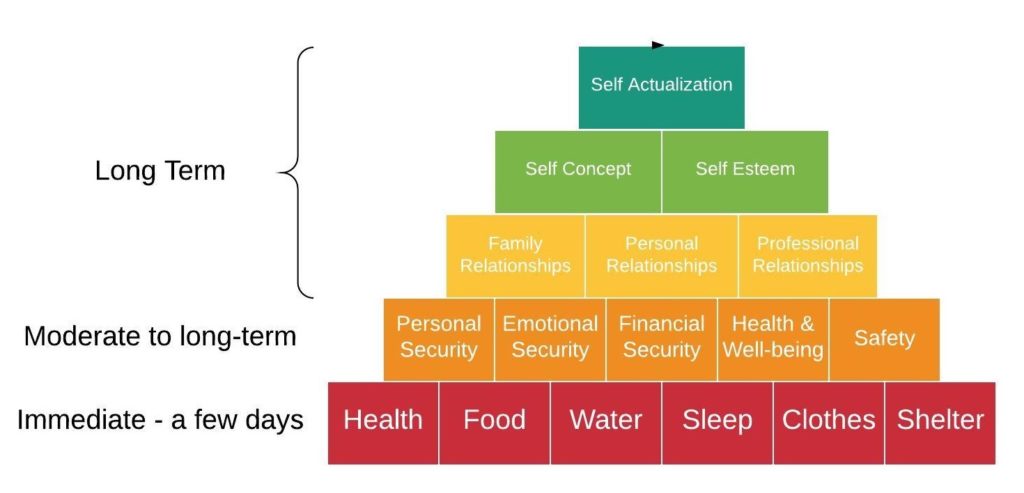I’ve been studying some of the material I have available about all the areas covered under the header of self-reliance. It started to fit into a mental diagram that, the further I went, looked more and more familiar. It finally dawned on me that I was describing Maslow’s Hierarchy of Needs, or at least the lower 60% of it.
For those of you unfamiliar or having forgotten, Abraham Maslow posits a hierarchy of needs or motivations any normal person needs in order to achieve their full potential. While his theory is open to debate, it’s hard to argue that a person can achieve true self esteem when they spend each day scrambling to obtain enough food or water to sustain them for another day. It’s difficult to provide any long-term safety for oneself if your health is so poor you can barely move.

Having made this connection I decided to redraw the pyramid from a different perspective, establishing the foundations of self-reliance. Not all areas of self-reliance are created equal. I’d argue that if you’re not already providing for your daily needs you stand little chance of providing for your more long term needs. Having an awesome exercise regimen when you have no water only means you’ll die that much more quickly.
Similarly, in comparing this hierarchy with Maslow’s, self-reliance can only take you so far. It may help with your relationships, but it is much less applicable to establishing self esteem or self actualization–though it can at least contribute. But helping you find your true purpose for living? That’s quite likely beyond the scope of self-reliance.
Philipp Guttmann re-conceptualized Maslow’s hierarchy as more of a continuum, which demonstrates some interesting ideas:
Most notable about this chart is the interplay between physiological needs and safety needs. While safety is never completely ignored, initially it doesn’t matter nearly so much as meeting our basic needs. It’s only as we start to regularly and predictably meet our physiological needs that we feel the need for safety more acutely. We’re starting to get somewhere in the daily struggle for survival, and we now worry that someone or something will come along and take it all away, dealing us a serious setback at best, ending our life at worst.
And as we begin to achieve more and more safety, we feel secure enough to start letting people into our lives, building relationships and collaborations that in turn increase our security, reducing the intensity of our need. Now, I’m not so sure we don’t start experiencing a need for companionship and belonging so far down the progression, but that’s just details. The hierarchy is not a empirical, data-driven model. It’s a psychological model of human development.
The underlying concepts, however, apply well to self-reliance. Anyone living day to day undoubtedly starts to desire the means to break out of that cycle. From the first cave man who killed a bison and ate like a king for a day or two only to have the rest of the carcass rot, to the average college student who waits tables to pay tuition, rent, and still eat, everyone longs to have enough of what they need to not have to wonder each day where their next meal is coming from or where they will sleep next. Self-reliance is knowing your needs are covered for a reasonable period of time, so that if something happens to threaten that, there’s time to set things right before your resources run out.
That’s not to say self-reliance is easy. It’s not. Nor is it automatic. Success in breaking out of the lowest level of needs into the second or third. On the contrary, as the above diagram shows, the intensity of a need may decrease, but it remains a need. Just because you’re making enough money to get you through a month with money left in your checking account doesn’t mean you’re not one pandemic or job-loss away from starvation.
That’s the position I nearly found myself in this year. I’m making good money. Our needs are covered every month. I have investments I can tap into if things get tight. But the COVID-19 showed me that sometimes it’s not the lack of money that’s the problem. If the stores are out of things because everyone is panic buying, money isn’t going to solve that problem so easily.
Self-reliance takes work, planning, and sustained effort. It takes focus, and there will never come a time when you can dust off your hands and say, “Done!” It’s not a task, it’s a way of life. But hopefully it’s a rewarding way of life.
